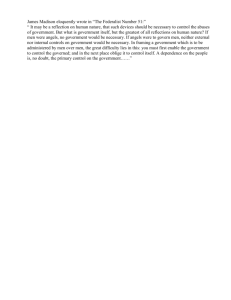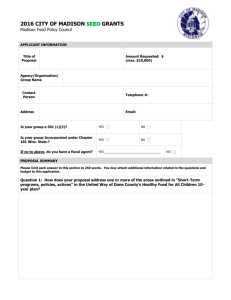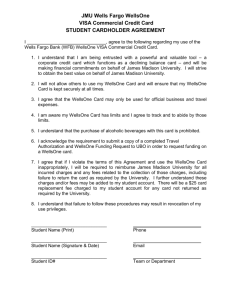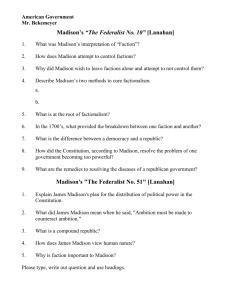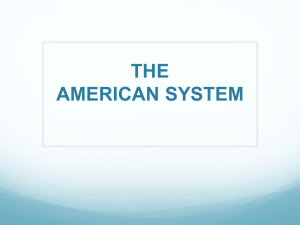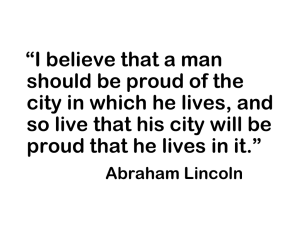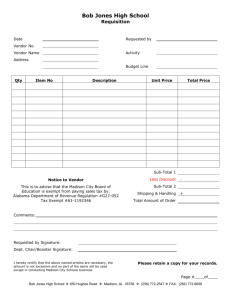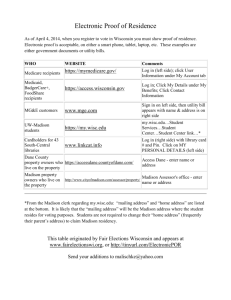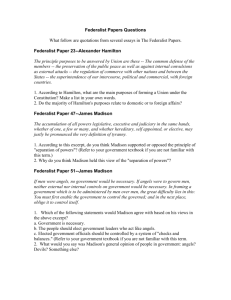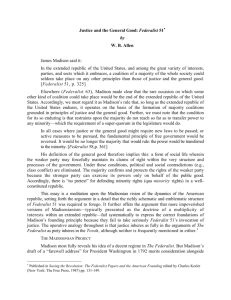UNITED STATES GOVERNMENT AND POLITICS * REQUIRED* 1
advertisement
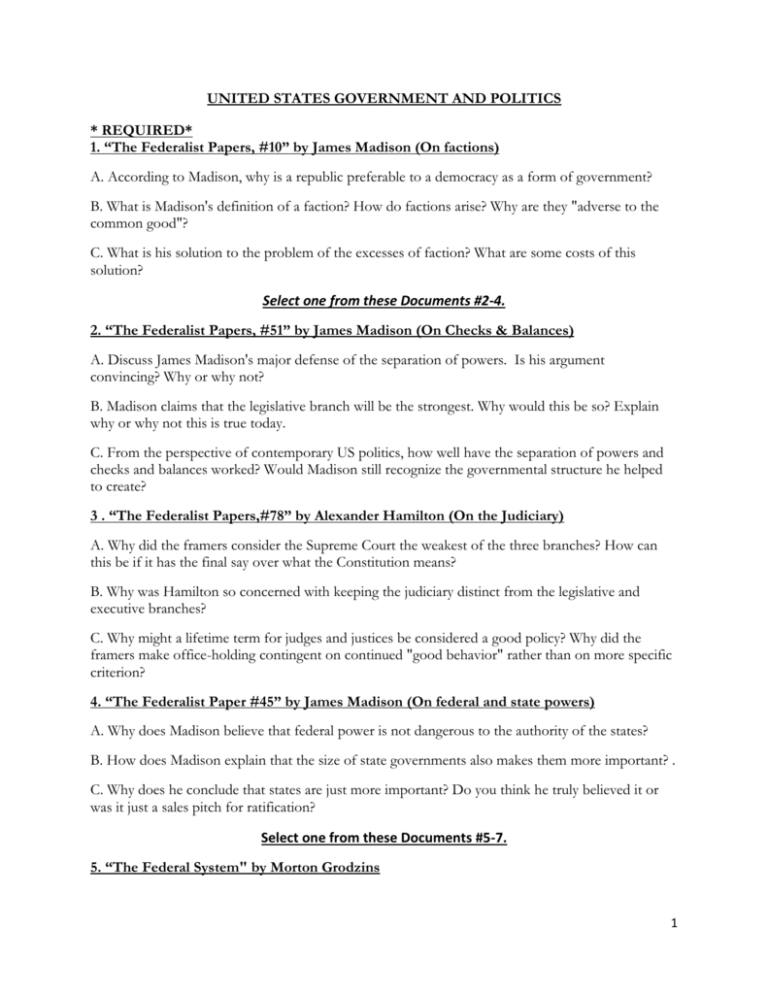
UNITED STATES GOVERNMENT AND POLITICS * REQUIRED* 1. “The Federalist Papers, #10” by James Madison (On factions) A. According to Madison, why is a republic preferable to a democracy as a form of government? B. What is Madison's definition of a faction? How do factions arise? Why are they "adverse to the common good"? C. What is his solution to the problem of the excesses of faction? What are some costs of this solution? Select one from these Documents #2-4. 2. “The Federalist Papers, #51” by James Madison (On Checks & Balances) A. Discuss James Madison's major defense of the separation of powers. Is his argument convincing? Why or why not? B. Madison claims that the legislative branch will be the strongest. Why would this be so? Explain why or why not this is true today. C. From the perspective of contemporary US politics, how well have the separation of powers and checks and balances worked? Would Madison still recognize the governmental structure he helped to create? 3 . “The Federalist Papers,#78” by Alexander Hamilton (On the Judiciary) A. Why did the framers consider the Supreme Court the weakest of the three branches? How can this be if it has the final say over what the Constitution means? B. Why was Hamilton so concerned with keeping the judiciary distinct from the legislative and executive branches? C. Why might a lifetime term for judges and justices be considered a good policy? Why did the framers make office-holding contingent on continued "good behavior" rather than on more specific criterion? 4. “The Federalist Paper #45” by James Madison (On federal and state powers) A. Why does Madison believe that federal power is not dangerous to the authority of the states? B. How does Madison explain that the size of state governments also makes them more important? . C. Why does he conclude that states are just more important? Do you think he truly believed it or was it just a sales pitch for ratification? Select one from these Documents #5-7. 5. “The Federal System" by Morton Grodzins 1 A. Explain why Grodzins believes that the American form of government has been erroneously symbolized by a 3 layer cake and should more accurately by characterized as a rainbow or marble cake? B. Why does Grodzins believe that there has never been a strict separation of national and state functions and that this was true even before the writing of the Constitution? C. According to Grodzins, explain the cyclical theme of centralization and decentralization of federalism. Show how this is especially true since the New Deal. 6. “The Founding Fathers: A Reform Caucus In Action” by John Roche A. What does Roche mean by a democratic elite? Is this phrase a contradiction in terms, or does it have real meaning? B. Discuss Roche's argument that the differences of opinion between the founders were "structural" rather than “ideological." On what issues did the founders fundamentally disagree? C. Roche states that some writers have characterized the Constitutional Convention as a "counterrevolutionary junta" and the Constitution as a coup d'etat. What arguments does Roche make to refute this view? Do you find his arguments convincing? Why or why not? 7. Excerpts from Second Treatise on Civil Government by John Locke A. For Locke, what is “natural law”? Why does he believe that the best forms of government are derived from "natural law?" B. Why are property rights so important to him? C. Explain why he believes it to be the right of the people to dissolve government once it no longer meets their legitimate expectations. -----------------------------------------------------------------------------------------------------------------------COMPARATIVE POLITICS Select two from these Documents #1-5. 1. “War and the State in Africa” by Jeffrey Herbst A. In Europe, how did taxation policies harness a foundation for national identity? B. Which has been more of a destructive force against African state-building: poverty or boundary creation? Explain. C. Does Herbst’s thesis prove valid when applied to current events, as in the present-day situation in Sudan. Clearly articulate the author’s thesis and then research issues facing Sudan from 2003 until today to discuss implications regarding war and state-building. 2 2. “Why Doesn’t the United States Have a European-Style Welfare State?” by Alberto Alesina, Edward Glaeser, and Bruce Sacerdote A. Compare the United States and Europe with respect to their methods of wealth distribution. Consider the following areas: a) government spending b) structure of taxation c) family benefits d) health care e) sickness and accidental injury benefits f) disability benefits g) poverty relief h) labor market policies B. In the authors’ opinion, what are the pros and cons of the growing welfare states in Europe? C. What were the reasons given for the difference in government redistribution policies between the United States and European nations? B) Which do you find, based on your own studies of American history and World history, to be the most important? 3. “Modern Democratic Regimes.” By Juan J. Linz and Alfred Stepan A. How are democratic, authoritarian, and totalitarian regimes similar and different? Provide and explain an example of each. Explain why Linz and Stepan propose a new topology. B. In what category would you put three of the following countries, and why? Great Britain, Mexico, China, Russia, Iran and Nigeria. C. How does pluralism fit with the ideas presented by James Madison in “Federalist #10”? 4. Excerpt from A Brief History of Human Liberty by Fareed Zakaria A. So, what is so significant about Constantine’s decision to move? B. Who plays the most influential role in defining liberty as we know it today: Montesquieu, Martin Luther, or Karl Marx? Explain. C. Why is China seen as the rising global superpower? Is cultural destiny at work? 5. “A Perfect Crime: Inequality in the Age of Globalization” By James K. Galbraith A. In the “Victorian system,” growth accepted what occurrence as a consequence? What modern economic model accepts this result as well? Which recent world leaders from the past 30 years have accepted it, and at whose expense? B. What is Kuznet’s hypothesis? Is it measureable? Galbraith calls for a new inequality data set. Why? How was Kuznet’s optimistic hypothesis ultimately proven false? C. What historical event does Galbraith ultimately blame for dramatic rises in economic inequality? How does this parallel U. S. experiences with the wealth gap since the late 1970s? What, ultimately, is the effect on sustainability? How does Galbraith liken this impact albeit in a non-physical way, to a coup d’etat? What is your reaction to this? 3
